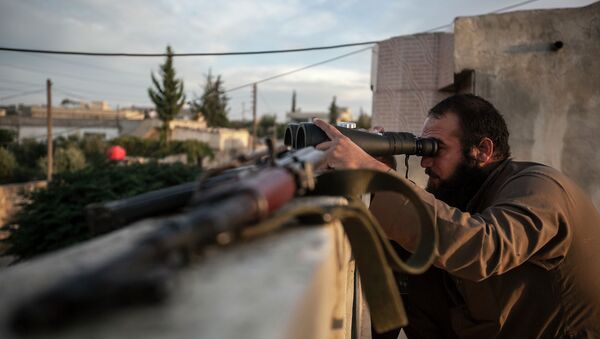Lehman does not believe that giving arms to the Syrian opposition, a policy of the US government, can possibly help stabilize the situation in the region, he said in an interview on Tuesday.
“I think, the US should answer [a] series of questions. Number one: who exactly is this opposition? Are they wearing military uniforms, insignia, who is commanding them, what exactly is the command structure, are they adherent to the rules of warfare, etc? All that we don’t have any answers [to],” the expert revealed.
By refusing to provide the Russian military with ISIL's coordinates in Syria, the US-led coalition is conducting its own strategy, Lehman explains.
“It’s an attempt to spread the belt of low-intensity conflicts from the Mediterranean to Baluchistan along the soft and resource-rich underbelly of Russia and former Soviet republics … to China, Lehmann describes. “That’s an attempt to destabilize that region and to weaken the Russian Federation and other Central-Asian countries,” he points out.
“[The] Russian government’s assessment … that airstrikes in Syria would be necessary also to maintain Russian national security interests is a correct one,” Lehman stated.
Commenting on a recent announcement by a spokesman of al-Nusra Front, an al-Qaeda branch in Syria, calling for a crusade against Russia to avenge their airstrikes, Lehman shed light on the affiliations and purpose of this organization.
“Al-Nusra [Front] is … Saudi, in part Qatar, in part pro-Israeli proxy… These statements are basically a proxy’s statements towards Russia within the context of creating the belt of low-intensity conflicts [across the region],” Lehman described.
There little difference between the various Islamist militant groups, currently waging war in Syria, the expert points out.
“These organizations, al-Nusra [Front], ISIL, Liwa al-Islam, Southern Shield, and others – all can easily swap names, be exchanged, have a slight change in command structure, but the function remains the same,” Lehman revealed.
Defeating ISIL won’t be enough, he believes.
“It doesn’t really matter, whether one would defeat ISIL, or whether ISIL disintegrates… There will be others who have exactly the same function,” Lehman added.
The expert sees a reconfiguration of the Middle East unavoidable.
“There are issues like the drawing of borders by former colonial powers, there is a Kurdish question, the latest national group that doesn’t have a state,” Lehmann explained, and concluded “There are a lot of issues there.”


